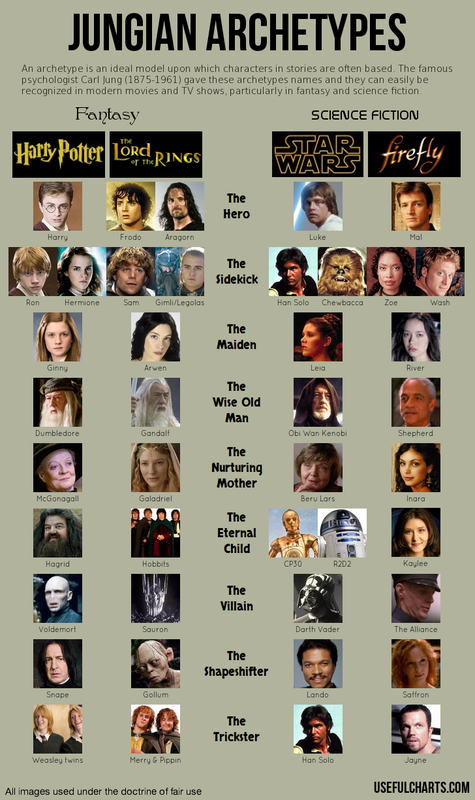by Nicolas Pinzon
First and foremost, an archetype is not a stereotype. Stereotypes reduce people into 2-dimensional labels that leave no room for individuality. Archetypes, on the other hand, are merely the acknowledgement that in storytelling, there are common qualities that certain types of characters possess. These qualities can be expressed in infinite ways and are based on core personality traits that are found in literature, mythology, and the world around us. Luke Skywalker, Erin Brockovich, and Rocky Balboa are all perfect representations of the Hero archetype, and yet, they are very different from each other and live in very different realities. Their similarities lie not in superficial characteristics, but in what motivates them; they are all willing to prepare, fight, and sacrifice everything for a moral victory. Correspondingly, the question of what archetypes you best fit into is not one about your race, or gender, or specific body type, but about what motivations you feel you can best represent.
According to the father of analytic psychology, Carl Jung, at any given point in time, we all fit into different archetypes that relate to our motivations at that specific moment. We are not just one thing. We all have been the rebel, the lover, the jester, the sage, but we do usually fit into some archetypes more often and more comfortably than into others. Some common archetypes observed in drama are:
- The Explorer: Motivated by a desire for discovery and a fear of conformity.
- The Lover: Motivated by an optimistic yearning for intimacy and romance.
- The Jester: Motivated by the idea of fun. Concerned only about the moment.
- The Rebel: Motivated by a desire of justice, revenge or revolution.
- The Ruler: Motivated by a need of control and power over others.
- The Orphan: Motivated by the necessity to belong and connect to others.
- The Artist: Motivated by a need to create something of longevity and value.
Needless to say, these are only a few of the many archetypes that exist in drama, and for each archetype, there are limitless ways of expressing its particular motivation. Some argue though, that when it comes to comedy, what makes an archetype is not always what motivates a character but what makes them a fool. For example:
- The Dreamer: An eternal optimist, blind to the realities of their situation.
- The Neurotic: Analytical to the point that they live in eternal irrational fear.
- The Rebel: Thinks he or she can get away with anything. They can’t.
- The Eccentric: lives in a completely different world from everyone else.
- The Narcissist: Swears they are God’s gift to the world. They are really clueless.
The reality is that writers use archetypes all the time to develop their characters, either consciously or subconsciously. And, seeing clear archetypes in an actor’s reel can help a casting director imagine such actor playing a similar part with similar flaws and motivations. At Award Winning Reels, we will work with you to develop a professional reel that emphasizes the different archetypes and qualities you can play in your own unique way. Our boutique Demo Reel Production Service provides top industry level writers, editors, and production team that will ensure that you have a reel you can feel proud of, and that represents your unique talents and personality.
Check out our Demo Reel Production page on our website here:
http://www.awardwinningreels.com/demo-reel-production.html

 RSS Feed
RSS Feed